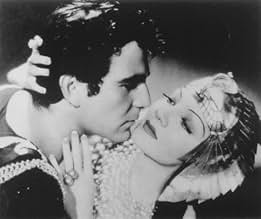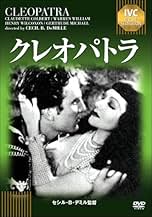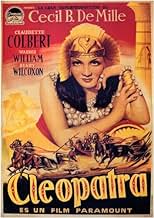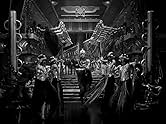IMDb-BEWERTUNG
6,8/10
4986
IHRE BEWERTUNG
Füge eine Handlung in deiner Sprache hinzuThe man-hungry Queen of Egypt leads Julius Caesar and Marc Antony astray, amid scenes of DeMillean splendor.The man-hungry Queen of Egypt leads Julius Caesar and Marc Antony astray, amid scenes of DeMillean splendor.The man-hungry Queen of Egypt leads Julius Caesar and Marc Antony astray, amid scenes of DeMillean splendor.
- 1 Oscar gewonnen
- 2 Gewinne & 4 Nominierungen insgesamt
Ian Maclaren
- Cassius
- (as Ian MacLaren)
Ferdinand Gottschalk
- Glabrio
- (Gelöschte Szenen)
Jayne Regan
- Lady Vesta
- (as Jane Regan)
Empfohlene Bewertungen
Was Demille more daring than any other director or was he just clueless? What does one say when the curtains close on Antony and Cleopatra and suddenly the screen erupts with more sexual symbols than any moment in Hollywood's history? From the phallic symbols (oars) to the yonic symbols (curtains) until finally both orgasmically mesh together in a final combination (a drummer with his drum), the scene tells us we're viewing the artistry of a kinky genius or a shameless carney.
And along with the jawdropping visuals, the film is crammed with juicy Demille-like dialog. Unlike other Demille films, this one has a wonderful cast to deliver his unique oneliners, and there are so many. My own favorites are the moments of dumbdowned Shakespeare. Instead of speaking of Cleopatra's "infinite variety" we are told she is always "many colored" and, of course, instead of "Et tu, Brute?" we get, "You? You too, Brutus?" What can you say about a movie in which Julius Ceasar says "Nope" to his senators? Nothing. One can only savor every delicious moment of camp that only a Demille could serve up.
The Taylor/Burton version is more spectacular, more intelligent, and more historical, but for those who relish kitsch--and this story always lends itself to it--this version is the best.
And along with the jawdropping visuals, the film is crammed with juicy Demille-like dialog. Unlike other Demille films, this one has a wonderful cast to deliver his unique oneliners, and there are so many. My own favorites are the moments of dumbdowned Shakespeare. Instead of speaking of Cleopatra's "infinite variety" we are told she is always "many colored" and, of course, instead of "Et tu, Brute?" we get, "You? You too, Brutus?" What can you say about a movie in which Julius Ceasar says "Nope" to his senators? Nothing. One can only savor every delicious moment of camp that only a Demille could serve up.
The Taylor/Burton version is more spectacular, more intelligent, and more historical, but for those who relish kitsch--and this story always lends itself to it--this version is the best.
One never thinks of Claudette Colbert as a sex symbol but she puts that to rest with her great interpretation of Cleopatra. What a siren she is as she vamps her way through this film. Henry Wilcoxon, truly an overlooked actor, is a perfect Antony. I have often wondered why he never made a bigger splash. I'm not as taken with Warren William as Caesar; he seems more at home in films with contemporary settings. The barge scene, with the ever increasing beat of the drums,implying what is happening or about to happen, is full of passion. More obvious scenes in modern movies leave nothing to the imagination....this leaves most of it to the imagination and is, therefore, much more effective. A highly recommended film.
Am also an admirer of many epics, especially medieval and biblical ones. The Antony and Cleopatra story is a timeless one, with Shakespeare's play having so many memorable quotes that stick in the mind for a long time. The cast is a talented one, with many giving fine performances elsewhere. Cecil DeMille was one of the kings when it came to epics lavish in spectacle, one of the finest examples being the wonderful 'The Ten Commandments'.
So 1934's 'Cleopatra' was seen with mixed expectations, am saying mixed because another epic re-telling of the 'Antony and Cleopatra' story was released in 1963 with a great cast (on paper) but to very overblown and heavily flawed effect. After watching it, 'Cleopatra' was a little better than expected as it was above mixed feelings at least. It is more romantic comedy and soap opera with a love triangle set in biblical times with the bare bones of the story rather than the real thing or being accurate, but it is a visually grand affair and is enjoyable as long as one doesn't expect a massive amount. Between this and the 1963 film, this to me is better by quite some way. Didn't care for that film very much, moderately liked this.
'Cleopatra' does have things that are easy to criticise certainly. Really didn't think much of Henry Wilcoxen as Antony personally, a character that should be conflicted and authoritative but Wilcoxen came over as too dull and bumbling (even Antony in the 1963 film wasn't this much of a lummox). Didn't always detect much passion between him and Claudette Colbert.
It is easy to understand why some criticise the dialogue too, it's better than that in the 1953 film but can be too heavy on the camp that it becomes very hammy and any laughter is not always intentional. And also the pacing, which is leaden in spots due to a few scenes going on for too long. As captivating as the scene on the barge is in visuals and staging it kind of goes on forever.
There are a lot of virtues however in 'Cleopatra'. The best aspects being the production values and Colbert. The way the film looks and its spectacle is the very meaning of lavish and grand. It looks expensive without being over-produced, it is not hard to see why the cinematography won an Oscar and the sets are a jaw-dropping feast. The costumes are of pure splendour, Colbert looks stunning in her garb. She sizzles in her acting too, in sensuality, shrewdness and wit. Of the two male leads, Warren William fares a lot better. Very theatrical (not unheard of for Caesar though) but he engages with the drama very well and at least seems to know how to approach his role, his chemistry with Colbert is more passionate too. Unrecognisable C. Aubrey Smith brings the conflicted edge, nuance and nobility to Enorbarbus that Wilcoxen's Antony should have had.
DeMille is very at home in the more spectacle-heavy moments without making them too overblown or stuffy. The music has the rousing splendour that fits the story well and adds to it. The dialogue is far from perfect but generally entertains and brought a few smiles to my face. There are memorable moments visually and how they're staged, those miniatures still look impressive. The story doesn't get too into overwrought soap opera territory and even if there is not much meat to the material it doesn't bore.
Overall, above average and a little better than expected but didn't wow me. 6.5/10
So 1934's 'Cleopatra' was seen with mixed expectations, am saying mixed because another epic re-telling of the 'Antony and Cleopatra' story was released in 1963 with a great cast (on paper) but to very overblown and heavily flawed effect. After watching it, 'Cleopatra' was a little better than expected as it was above mixed feelings at least. It is more romantic comedy and soap opera with a love triangle set in biblical times with the bare bones of the story rather than the real thing or being accurate, but it is a visually grand affair and is enjoyable as long as one doesn't expect a massive amount. Between this and the 1963 film, this to me is better by quite some way. Didn't care for that film very much, moderately liked this.
'Cleopatra' does have things that are easy to criticise certainly. Really didn't think much of Henry Wilcoxen as Antony personally, a character that should be conflicted and authoritative but Wilcoxen came over as too dull and bumbling (even Antony in the 1963 film wasn't this much of a lummox). Didn't always detect much passion between him and Claudette Colbert.
It is easy to understand why some criticise the dialogue too, it's better than that in the 1953 film but can be too heavy on the camp that it becomes very hammy and any laughter is not always intentional. And also the pacing, which is leaden in spots due to a few scenes going on for too long. As captivating as the scene on the barge is in visuals and staging it kind of goes on forever.
There are a lot of virtues however in 'Cleopatra'. The best aspects being the production values and Colbert. The way the film looks and its spectacle is the very meaning of lavish and grand. It looks expensive without being over-produced, it is not hard to see why the cinematography won an Oscar and the sets are a jaw-dropping feast. The costumes are of pure splendour, Colbert looks stunning in her garb. She sizzles in her acting too, in sensuality, shrewdness and wit. Of the two male leads, Warren William fares a lot better. Very theatrical (not unheard of for Caesar though) but he engages with the drama very well and at least seems to know how to approach his role, his chemistry with Colbert is more passionate too. Unrecognisable C. Aubrey Smith brings the conflicted edge, nuance and nobility to Enorbarbus that Wilcoxen's Antony should have had.
DeMille is very at home in the more spectacle-heavy moments without making them too overblown or stuffy. The music has the rousing splendour that fits the story well and adds to it. The dialogue is far from perfect but generally entertains and brought a few smiles to my face. There are memorable moments visually and how they're staged, those miniatures still look impressive. The story doesn't get too into overwrought soap opera territory and even if there is not much meat to the material it doesn't bore.
Overall, above average and a little better than expected but didn't wow me. 6.5/10
Reading the comments on this film today, one finds almost all of them comparing it with the 1963 Mankiewicz/Taylor epic which is in colour and twice as long. A significant proportion of those who have seen both versions have expressed their preference for this earlier B/W film by Cecil Demille. But the comments also seem to indicate many of the keen movie fans writing these reviews have little appreciation that several other versions also exist .Two silent films were made, one produced in 1910 runs for 90 minutes, the other produced in 1917 is now totally lost, probably these are now only of historic interest. There have also been versions from other countries in languages other than English which few North American movie fans will have seen, and television versions that suffered from limited budgets. But the 1945 film 'Caesar and Cleopatra' made by Gabriel Pascal, based directly on the play by George Bernard Shaw and featuring Vivian Leigh as Cleopatra certainly must be considered whenever major film versions of Cleopatra's life are being compared. The different writing credits given to these three films are interesting. Those familiar with the works of Shakespeare might expect a life of Cleopatra to be based on his two plays 'Julius Caesar' and 'Anthony and Cleopatra' (although an earlier starting date would be required), but no direct credit is given to Shakespeare in any of these three films. George Bernard Shaw wrote his play Caesar and Cleopatra covering most of Cleoopatra's life in 1901.This work is probably the most frequently presented on stage, and is regarded by most people today as the precursor of all three films. It certainly contributes a lot to their structure. However Demille is interested only in his story - his film.is credited to his two Hollywood writers - one for the adaption and the other for the screenplay. By contrast credits for the 1963 film are given to the histories written by Plutarch and Suetonius, whilst Pascal's 1945 film is not only based directly on the GBS play but uses a film-script written specially for it by the 82 year old Shaw himself, so writing credits go entirely to Shaw. A master of words, Shaw crafted his plays so that their dialogue could feature as many as possible of his witticisms. He was also a crusader who supported many causes including emancipation and female equality - these were often highlighted in his dramatic works. If history had to be edited a little to enable him to write more sparkling dialogue, so be it.
It follows that the 1963 Mankiewicz version is regarded as the most historically reliable, whilst there are a few problems of accuracy in Pascal's version, particularly in that Cleopatra is portrayed as too young and inexperienced at the start of the film (remarkable since Vivian Leigh who was playing her was 32 at the time); and the Demille version must be accepted as designed to put spectacle ahead of historical veracity. All three films feature great performances, especially in the key role of Cleopatra (and it is very interesting to compare the different images of her which the three great divas present); but many of the supporting roles are also very powerfully acted, and all three films provide examples of what can only be described as the work of great Directors. They also all feature very competent camera work, and there is no justification for not enjoying whichever of them one chooses to view. Our role here is to comment on Demille's version - not the other two. What we should primarily expect from this film is the superlative spectacle for which Demille is so famous. Similarly if we were watching Pascal's film we would be entitled to expect the most sparking dialogue and with Mankiewicz's version we could expect to be seeing the most historically accurate presentation. Unfortunately an increasing number of modern viewers regard full colour presentation as essential for true spectacle so the 1934 version starts with a significant handicap; and the number who have expressed a preference for it when so many would instinctively regard the 1963 colour presentation as inherently more spectacular, is a remarkable tribute to Demille. Claudette Colbert played very few period parts, she was most at home playing the typical Amercan wife and mother, But she was a great actress and her performances as Poppaea (The Sign of the Cross) and Cleopatra are hard to fault. Some viewers have suggested they would have been happier if Cleopatra had been played by an actress with an ethnically Mediterrenean appearance, rather than with the more northerly features of Colbert. I cannot go along with this - whenever we watch acting we accept that we are watching a representation of what might have occurred, not a portrayal of actual individuals or events. In my view Colbert gave a magnificent display of sexuality capable of attracting the attention of even the most dedicated army commander. Demille handled everything else admirably. Other memorable performances come from Warren William as Julius Caesar, Henry Wilcoxon as Marc Anthony, Aubrey Smith as Enobarus, and Ian Keith as Octavian, a key part which is often not adequately appreciated. The battle sequences are kept very brief (budget?) but are much more effective than those in other films from the same period, and the barge scene in which Cleopatra seduces Mark Anthony is widely regarded as a classic. Demille did not go overboard to the same extent that he did in some other films, but a hint of overacting, characteristic of the silent film era, has been continued here and is extremely effective. Particularly noteworthy is Cleopatra's triumphant entry into Rome which here looks like a real city with real people in residence, not just a film set. This is certainly a film that even the most discerning viewers can still enjoy..
It follows that the 1963 Mankiewicz version is regarded as the most historically reliable, whilst there are a few problems of accuracy in Pascal's version, particularly in that Cleopatra is portrayed as too young and inexperienced at the start of the film (remarkable since Vivian Leigh who was playing her was 32 at the time); and the Demille version must be accepted as designed to put spectacle ahead of historical veracity. All three films feature great performances, especially in the key role of Cleopatra (and it is very interesting to compare the different images of her which the three great divas present); but many of the supporting roles are also very powerfully acted, and all three films provide examples of what can only be described as the work of great Directors. They also all feature very competent camera work, and there is no justification for not enjoying whichever of them one chooses to view. Our role here is to comment on Demille's version - not the other two. What we should primarily expect from this film is the superlative spectacle for which Demille is so famous. Similarly if we were watching Pascal's film we would be entitled to expect the most sparking dialogue and with Mankiewicz's version we could expect to be seeing the most historically accurate presentation. Unfortunately an increasing number of modern viewers regard full colour presentation as essential for true spectacle so the 1934 version starts with a significant handicap; and the number who have expressed a preference for it when so many would instinctively regard the 1963 colour presentation as inherently more spectacular, is a remarkable tribute to Demille. Claudette Colbert played very few period parts, she was most at home playing the typical Amercan wife and mother, But she was a great actress and her performances as Poppaea (The Sign of the Cross) and Cleopatra are hard to fault. Some viewers have suggested they would have been happier if Cleopatra had been played by an actress with an ethnically Mediterrenean appearance, rather than with the more northerly features of Colbert. I cannot go along with this - whenever we watch acting we accept that we are watching a representation of what might have occurred, not a portrayal of actual individuals or events. In my view Colbert gave a magnificent display of sexuality capable of attracting the attention of even the most dedicated army commander. Demille handled everything else admirably. Other memorable performances come from Warren William as Julius Caesar, Henry Wilcoxon as Marc Anthony, Aubrey Smith as Enobarus, and Ian Keith as Octavian, a key part which is often not adequately appreciated. The battle sequences are kept very brief (budget?) but are much more effective than those in other films from the same period, and the barge scene in which Cleopatra seduces Mark Anthony is widely regarded as a classic. Demille did not go overboard to the same extent that he did in some other films, but a hint of overacting, characteristic of the silent film era, has been continued here and is extremely effective. Particularly noteworthy is Cleopatra's triumphant entry into Rome which here looks like a real city with real people in residence, not just a film set. This is certainly a film that even the most discerning viewers can still enjoy..
I have been very fond of this movie for years, particularly as compared with Fox's bloated monstrosity of 1963. Colbert is admittedly somewhat miscast (her face is altogether Parisienne), but she handles the part with considerable charm. Warren William, usually a very limited actor, is as good a Caesar as I have seen on film, commanding and uncomfortable by turns; while Henry Wilcoxon is the definitive Mark Antony, laughing, brawling, swaggering, crude and brooding. C. Aubrey Smith as Enobarbus, the last of the hardcore Roman republicans, is perfect. Victor Milner's cinematography is superb, if old-fashioned. There is one magnificent pullback shot aboard Cleopatra's barge, with more and more stuff entering the frame, which as pure cinema is worth more than all four hours of the Liz Taylor version for my money. Shakespeare and Shaw have both been drawn upon here and there, and the movie has generally good (and fun) dialogue, not always one of DeMille's strengths. Consider also the scene of Cleopatra's entrance into Rome: contrary to DeMille's usual reputation, this scene is underplayed, depicting a plausible parade through a very real Roman street with authentic trappings, compared to the outrageously bogus and overblown spectacle given us in 1963. A word is also in order for the music of Rudolph Kopp, an extremely obscure Hollywood composer, who turns in an atmospheric score redolant of the old silent movies. This style is easy to make fun of, but see how effective it is in the highly theatrical opening credits! DeMille used silent film technique well into the talkie era, particularly in crowd scenes, and it still works. The battle scenes are the weakest point, since evidently Paramount ran out of cash and C.B. had to make do with a bunch of short shots put together with Russian cutting; nevertheless, this is still as good a picture on the subject as has yet been made, a bit of extravagant old Hollywood at its most polished.
Wusstest du schon
- WissenswertesWhen Cecil B. DeMille was in pre-production on this film, he asked to screen the original Cleopatra (1917) with Theda Bara. No prints could be found in Los Angeles, so a copy was borrowed from the Fox office in New York. After DeMille viewed the film, it was sent back to Little Ferry, NJ. On 7/9/37 a fire at the storage facility destroyed almost all of Fox's known archived prints, most likely including "Cleopatra". The screening for DeMille's company, on 2/15/34, may have been the last time anyone saw the legendary film. However, on September 14, 2023, 42 seconds of extremely rare footage of the final act in which Cleopatra prepares to die as the Roman Legion marches upon her palace was procured from a 1920's toy film projector and presented on YouTube.
- PatzerThe main doors to Cleopatra's chambers have modern metal hinges.
- Zitate
Cleopatra: Together we could conquer the world.
Julius Caesar: Nice of you to include me.
- Alternative VersionenThe movie was released in Germany with German direction by Kurt Bleines and German dialogue by Helmut Brandis and Helena von Fortenbach.
- VerbindungenEdited into Spisok korabley (2008)
Top-Auswahl
Melde dich zum Bewerten an und greife auf die Watchlist für personalisierte Empfehlungen zu.
Details
- Laufzeit1 Stunde 32 Minuten
- Farbe
- Seitenverhältnis
- 1.37 : 1
Zu dieser Seite beitragen
Bearbeitung vorschlagen oder fehlenden Inhalt hinzufügen








































